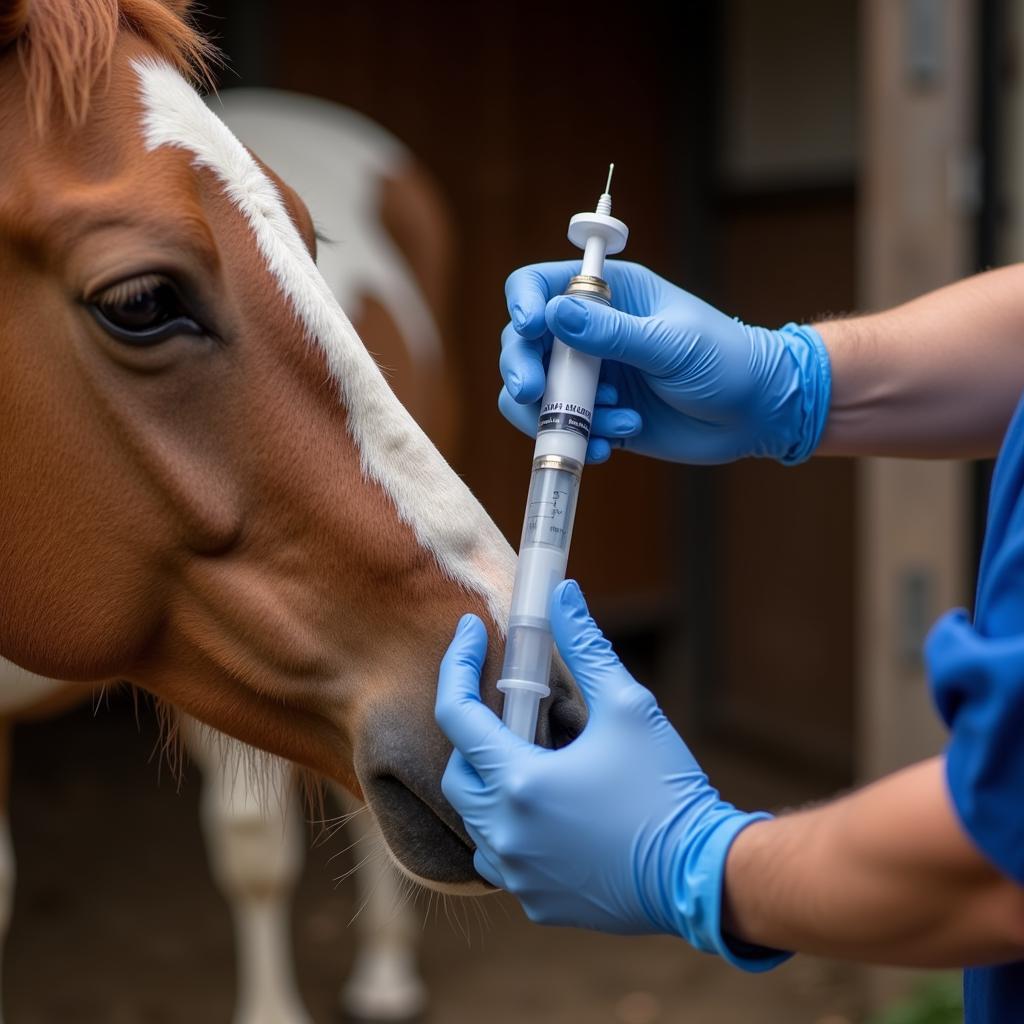Dexamethasone Horses Dosage is a critical topic for horse owners. Understanding the appropriate use and administration of this powerful corticosteroid is essential for ensuring the well-being of your equine companion. This guide provides in-depth information on dexamethasone in horses, covering its uses, dosage guidelines, potential side effects, and important precautions.
Understanding Dexamethasone in Horses
Dexamethasone is a potent anti-inflammatory and immunosuppressive drug commonly used in veterinary medicine, including equine care. It’s classified as a glucocorticoid, a type of steroid hormone that mimics the effects of cortisol, a hormone naturally produced by the adrenal glands. Vets prescribe dexamethasone to manage various conditions in horses, including inflammatory diseases, allergic reactions, and certain types of shock. It’s crucial to remember that while dexamethasone can be highly effective, its use should always be under the strict guidance of a veterinarian. Administering the incorrect dexamethasone horses dosage can have serious consequences for your horse’s health.
After the initial introduction, it’s important to delve into the specific dosages. For a deeper understanding of dosages related to heaves, see our guide on dexamethasone dosage for horses with heaves.
Dexamethasone Dosage Guidelines for Horses
Determining the correct dexamethasone horses dosage is crucial and should always be determined by a qualified veterinarian. Factors influencing the appropriate dosage include the horse’s weight, the condition being treated, and the route of administration (intravenous, intramuscular, or oral). Generally, the dosage ranges from 0.05 to 0.2 mg/kg of body weight, but this can vary significantly. Never attempt to self-medicate your horse. A miscalculated dose can lead to adverse effects, potentially harming your horse.
 Dexamethasone Injection for Horses
Dexamethasone Injection for Horses
Potential Side Effects of Dexamethasone in Horses
While dexamethasone can be beneficial, it’s essential to be aware of potential side effects. These can include increased thirst and urination, suppressed immune system function, laminitis (inflammation of the hoof laminae), and delayed wound healing. Long-term use can also lead to Cushing’s disease-like symptoms, including increased appetite, weight gain, and a pot-bellied appearance. For information on managing pain associated with these side effects, refer to our resource on horse pain killers.
Precautions and Considerations
Several precautions are crucial when administering dexamethasone to horses. Pregnant mares should avoid dexamethasone as it can induce premature labor. Horses with pre-existing conditions such as infections, ulcers, or Cushing’s disease should be monitored closely. Regular bloodwork is often recommended to monitor the horse’s response to the medication and detect any potential complications.
You can find further information regarding specific dexamethasone doses at our dedicated page on horse dexamethasone dose.
When Should You Contact Your Veterinarian?
Any signs of discomfort or unusual behavior after administering dexamethasone should prompt an immediate call to your veterinarian. Early intervention is key to managing potential side effects and ensuring the best outcome for your horse. Never hesitate to contact your vet if you have any concerns about your horse’s health.
For a comprehensive understanding of the equine muscular system, and how dexamethasone may affect it, visit our page on the muscular system of the horse.
Conclusion
Understanding dexamethasone horses dosage is crucial for responsible horse ownership. This medication can be a valuable tool in managing various equine health issues, but its use requires careful consideration and veterinary oversight. Always consult your veterinarian to determine the appropriate dosage and monitor your horse for any potential side effects. By working closely with your vet, you can ensure the safe and effective use of dexamethasone to maintain your horse’s health and well-being.
FAQs
-
What is dexamethasone used for in horses?
Dexamethasone is used to treat inflammatory conditions, allergic reactions, and certain types of shock in horses. -
What are the potential side effects of dexamethasone in horses?
Side effects can include increased thirst, urination, suppressed immune system, laminitis, and delayed wound healing. -
Can pregnant mares receive dexamethasone?
Pregnant mares should generally avoid dexamethasone as it can induce premature labor. -
How is dexamethasone administered to horses?
Dexamethasone can be administered intravenously, intramuscularly, or orally. -
What should I do if my horse experiences side effects from dexamethasone?
Contact your veterinarian immediately if your horse experiences any adverse reactions.
Common Scenarios and Questions
- Scenario: My horse has heaves and I’m considering dexamethasone. What should I do?
- Answer: Contact your veterinarian. They can diagnose the condition and determine if dexamethasone is the appropriate treatment and prescribe the correct dosage. For information regarding dust-free bedding options, which can help manage heaves, see our article on dust free horse bedding.
Further Reading and Resources
- For information on other pain management options for horses, please visit our page on horse pain killers.
Contact Us
For assistance with your horse’s health, please contact us: Phone: 0772127271, Email: [email protected] or visit our office at QGM2+WX2, Vị Trung, Vị Thuỷ, Hậu Giang, Việt Nam. We have a 24/7 customer support team.